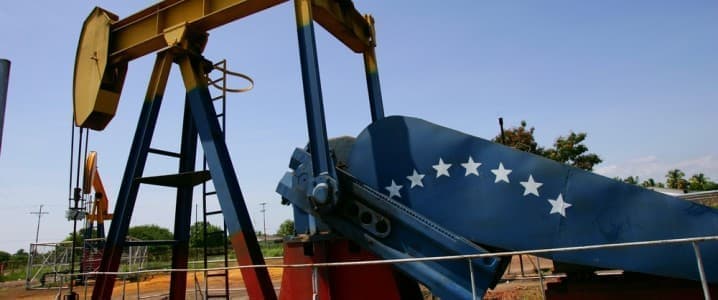Venezuela Is Scrambling To Make The Most Of The Global Oil Shortage

Venzuela is scrambling to capitalize on the global oil shortage, but it’s just not happening.
Despite easing sanctions, the Maduro regime is struggling to ramp up production.
There has been around a month-long pause on crude and fuel exports, as PDVSA demands prepayment ahead of loading cargo, either with cash, goods, or services.
Venezuela is making the most of the global oil shortage, in the wake of the Russian invasion of Ukraine, as the U.S. was forced to make certain concessions on its sanctions on Venezuelan crude to boost its energy security. Oil major Chevron has recommenced operations in Venezuela, and several other markets are gradually increasing their imports of Venezuelan crude, many having long circumvented U.S. sanctions. However, the production rate has not increased as much as many initially expected, leading the Venezuelan oil industry to make greater demands in exchange for its crude.
In 2018, President Trump ordered sanctions on Venezuelan crude in an attempt to restrict the power of the country’s dictator, President Maduro. In a press statement at the time, Secretary of State Michael Pompeo said“Maduro and his cronies have used state-owned PDVSA to control, manipulate, and steal from the Venezuelan people for too long, destroying it in the process. Today’s action will prevent Maduro and other corrupt actors from further enriching themselves at the expense of the long-suffering Venezuelan people.”
Over three years after the sanctions came into place, the U.S. is once again turning to Venezuela – which has seen little change in its political system – to boost its energy security, as it attempts to decrease its reliance on Russian energy. In December 2022, Chevron Corp sent two oil tankers to Venezuela, after the U.S. government approved limited crude imports from the South American oil giant after the long suspension. One tanker picked up the first cargo of Venezuelan oil, while the other delivered diluents to a Chevron oil joint venture. In recent years, Venezuela’s oil industry has suffered from a shortage of the diluents required to make its extra-heavy crude useable, primarily relying on trades of crude for diluents with Iran.
The U.S. also approved the development of a major gas field by Trinidad and Tobago in Venezuelan waters in late January, signalling the further easing of sanctions on Venezuelan energy. The new license will permit Trinidad to work with Venezuela’s state-run PDVSA.
However, “the Maduro regime will not be permitted to receive any cash payments from this project,”according to a senior U.S. official. The development is expected to boost Caribbean regional energy security, with the hope of producing 350 million cubic feet of gas per day from the Dragon field.
As the U.S. eases its sanctions on Venezuela, Chevron has been given a six-month license to expand its role at four joint ventures for the production, processing, and export of crude bound for the U.S. President Biden hopes this move will encourage Madero to work with opposition leaders to organise a general election later in the year. However, there are still significant restrictions on Chevron’s activities. The company cannot carry out transactions that make payments, including taxes and royalties, to Venezuela’s government, PDVSA or related entities. Chevron is also forbidden from expanding operations beyond those that existed before the sanctions. This restricts any potential economic benefits for Venezuela from the operations, also preventing the country from redeveloping its long-neglected oil industry following“two decades of corruption, malfeasance, lack of investment in critical maintenance and neglect”, which caused vital energy infrastructure to corrode.
But Venezuela is no longer bowing to the demands of others, with the state-owned oil firm PDVSA establishing stricter terms for buyers. There has been around a month-long pause on crude and fuel exports, as PDVSA demands prepayment ahead of loading cargo, either with cash, goods, or services. The CEO of PDVSA, Pedro Tellechea, put the rule in place in January due to the fact many buyers have avoided making payments for oil over the last year, which negatively affected the country’s economy.
On 27th January, an estimated 28 vessels were sitting near PDVSA ports waiting to load around 45 million barrels of oil and fuel for export, as Tellechea insisted on prepayment. A PDSVA contract explains that prepayment puts the firm “in a favourable business position because it would secure income for the country that is essential to solve its economic situation.”
Yet, despite the easing of sanctions and greater demands being seen from the PDVSA, leading energy analysts believe that Venezuela’s oil industry will continue to suffer through 2023. Francisco Gonçalves, a senior analyst and energy economist at the energy consultancy FGE, explained“without further sanctions relief, we expect Venezuela’s production gains in 2023 will be limited”. He added, “Chevron joint venture production aside, Venezuela’s output for most of 2022 was stuck at around 650,000 barrels per day… showing that the country has limited capacity for production growth.” Further, “With regards to the output from Chevron’s four Venezuelan joint ventures over the next months, growth is likely to be minimal, given Chevron has said it is not planning on making any significant investment there in the short term,” he stated.
So, as the U.S. eases its sanctions on Venezuela, and new oil routes are being developed between the South American country and other parts of the world, its oil industry continues to see several restrictions to redevelopment and expansion, leading PDVSA to tighten its export rules. But without economic benefits being seen from reduced sanctions, and with its oil industry in a dire state, Venezuela is unlikely to see a significant boost in oil production any time soon.




